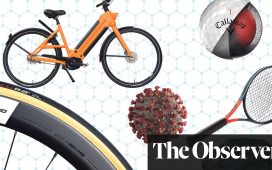James Lovelock has spent a lifetime pondering the forces that shape Earth. It was a pursuit that brought about his most famous creation: a view of the world where life maintains the conditions for life, which he niftily named Gaia theory.
The hypothesis, as it was back then, was wholeheartedly embraced by the fledgling green movement of the 1970s. But for Lovelock, who turned 100 on Friday, more pressing threats to the planet come from nature, not humans. In particular, he’s worried about asteroids.
In a video interview from his home in Dorset, Lovelock gave his full backing to work by space agencies to deflect or destroy any incoming space rocks on a collision course with Earth.
“We have ample evidence that asteroids repeatedly hit planets in the solar system and they do catastrophic damage when they do,” he said in the video, recorded for the Science Museum as part of its celebration of Lovelock’s career.
“I’m a cheerful person and I don’t like the idea we’re going to be wiped out. It seems such as waste, after all this time, doing all these things, all for nothing.”
Lovelock, a maverick from the start, has a long list of achievements to look back on. When a former boss, a specialist in airborne diseases, moaned that no equipment existed to measure draughts in a room, Lovelock went and invented it.
He built the electron capture device, an instrument that sniffed faint traces of pollutants such as the chlorofluorocarbons (CFCs) that were destroying the ozone layer. Before heading to California to work on instruments for Nasa’s exploration of the moon, he became expert at freezing and reviving hamsters, all in the name of research.
In the interview, Lovelock explained how Gaia theory might have turned out very differently. The name was suggested by a neighbour of his, the novelist William Golding, but Lovelock heard “gyre” rather than Gaia. The misunderstanding was cleared up later, with Golding exclaiming: “No, no, no, I meant the Greek goddess!”
If humanity can avoid death by asteroid, Lovelock sees a new dawn for life on Earth. Never mind the anthropocene, the epoch defined by human influence on the planet. Lovelock talks of the Novacene, a future explored in his latest book, where artificial intelligence rules the world.
“This, I think, opens a doorway for the evolution of new species or organisms which are entirely running on information,” he said. In this future of digital beings, humans may still have a place. Writing in Novacene, Lovelock noted that our bit-based overlords may put organic life to good use – to keep the planet cool.














